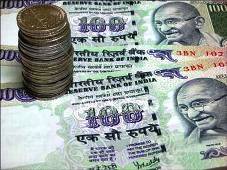 If earnings downgrades are any indication of market sentiment, then expectations from Indian equities are near the crisis levels of 2008-09.
If earnings downgrades are any indication of market sentiment, then expectations from Indian equities are near the crisis levels of 2008-09.
According to data compiled by Capital IQ, a Standard & Poor's company, last month (till August 19), there were 903 earnings downgrades, as against 356 upgrades for the BSE-100 companies.
These are the highest number of downgrades over the past six years.
Analysts are not quite betting on the earnings potential of India's top 100 listed companies.
The earnings revision ratio (upgrades divided by downgrades) of BSE-100 stocks touched 0.39, last seen in the month of December 2008.
The impact of this is also reflected in share prices.
The BSE-100 index is down 20 per cent from its peak in October 2010.
Though the pessimism seems at its highest, there's room for more pain.
"I think the next four months will be crucial in deciding the bottoming of the earnings downgrades.
"There is some more room left, to the extent of five-six per cent, because the impact of higher interest rates' rise on non-performing assets for banks and some pressure from the demand side will be seen in the coming quarter," said Harendra Kumar, head of institutional equities & global research at Elara Capital.
At the end of the first quarter, analysts downgraded earnings estimates for several companies, pulling down earnings estimates of the Sensex from the earlier levels of Rs 1,320 per share to Rs 1,230 at the end of the first quarter.
Apart from the domestic issues, which could accentuate in the case of a rise in the interest rates, global issues could also play spoilsport.
"My sense is that there is further possibility of downgrades, as a lot of these domestic and international issues are yet to be factored in the earnings, which the analysts would incorporate once the numbers are out or possibly after the second quarter results," said Vinay Khattar, research head, Edelweiss Wealth Management.
A primary factor for earnings downgrades is the gloomy demand scenario in developed markets.
The exposure of BSE-100 index companies to markets abroad is to the tune of 24 per cent and it's 52 per cent for Sensex companies.
Tata Motors, which derives 62 per cent of its revenue from international markets, saw 20
Interest rate sensitives
The BSE-100 is representative of a broader universe, which accounts for 70 per cent of the total market capitalization and represents 18 sectors.
The speed of downgrades has increased recently.
August also happens to be the ensuing month after the Reserve Bank of India made a large 50-basis point raise in bank rates in the last week of July.
After the 50-bps rate rise in July, several analysts cut earnings estimates, particularly for interest rate-sensitive sectors.
Not surprisingly, downgrades have been the highest for real estate, capital goods, construction and banking stocks, which are more sensitive to the interest rate cycle.
State-owned banks such as Bank of India, Union Bank of India and Canara Bank are chart-toppers when it comes to downgrades.
On the other hand, from the list it seems that companies in the consumer space, such as Asian Paints, Hero MotoCorp, Titan and ITC, are expected to continue their earnings growth trajectory.
Operating margins decline
Importantly, most downgrades came after the end of the earnings season, in the month of August, where most of the research houses felt earnings across the board were below their expectations, on the back of rising interest costs and lower operating margins.
"At the aggregate BSE-100 level, while first quarter revenue growth was extremely strong at 30 per cent year-on-year, net profit growth came in at 10 per cent.
"This was primarily due to an 80-bps decline in Ebitda (earnings before interest, taxes, depreciation and amortisation) margins and a 41 per cent y-o-y increase in interest expenses," said Rakesh Arora, managing director and head of research at Macquarie Capital, in a recent note.
The declining trend is expected to continue on the margins side.
More important, pressure from the demand side is likely to be felt. For instance, analysts say if automobile sales are sluggish and capital expenditure is not happening, it is difficult to visualise how demand for steel and cement will come through.
With the economy now visibly slowing, analysts expect another round of downgrades to happen at the end of the second quarter, if profitability continues to shrink.








